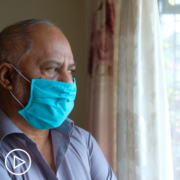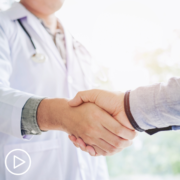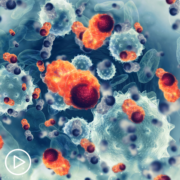Partnering With Your Doctor on CLL Treatment Decisions
Partnering With Your Doctor on CLL Treatment Decisions from Patient Empowerment Network on Vimeo.
Which CLL treatment could be right for you? Dr. Steven Coutre, a CLL specialist, reviews current approaches and explains why patients should stay informed about emerging options.
See More From The Pro-Active CLL Patient Toolkit
Related Resources

|

|

|
Transcript:
Dr. Steven Coutre:
Well, any decision about treatment is, of course, a joint decision between the physician and the patient. It’s our job to really educate each individual patient about their options and also, I think, very importantly, determine what their goals are. You don’t really follow a strict algorithm. It’s really making a decision for each individual patient.
So, of course that takes into account other medical conditions they may have, the nature of their disease, why it is that we’re treating that individual, what we’re trying to accomplish, and very importantly, what the goals of therapy are for that individual. That may be very different, for example, for somebody who’s quite young versus somebody who’s older or who might have significant medical comorbidities.
I think patients are always well served by asking questions about the treatment, side effects of treatment, of course, these days, cost comes into play, so I think we have an obligation to let patients know the differences between the therapies because often we have choices about a therapy. There isn’t any one best therapy, for example. It’s often a number of choices, and sometimes that can be very, in some ways, confusing for patients, because they wanna know, “Well, what’s the best therapy?” and as I mentioned, it’s not so much what’s the best. It’s what’s the best for that patient, and many times that’s choices of treatment.
Some are time limited, for example. Some are continuous therapies. So, there’s plusses and minuses, and again, it all goes back to what’s your goal for that individual patient, what are their preferences in terms of the treatment that they want to receive.
The drugs that I mentioned earlier are Bruton Acalabrutinib, Venetoclax, for example. These are really the first of our new really transformative drugs for CLL. Drugs, along sometimes, with our antibodies, Rituximab and Obinutuzumab, which are really replacing the use of chemotherapy in treating the disease. So, moving forward, we’re looking at combinations of these drugs. Can we drive responses deeper? That would lend itself to stopping therapy, in some case, instead of using continuous daily therapy as we currently do with drugs like Ibrutinib or Acalabrutinib.
So, that’s the major focus right now. There, of course, will be other new drugs. There’s a third drug, Zanubrutinib, which is another BTK inhibitor, so that’ll probably play a role in treating CLL. There may be differences in side effect profiles between these drugs. There isn’t any new drug that we’re looking at currently that’s far enough along to say that it’s gonna be yet another fundamentally different, revolutionary therapy for CLL. But those, of course, can come along as we learn more about the biology of the disease.
You may have heard about CAR T-Cell Therapy, where you’re using your body’s own immune system to try to target the cancer. This has been very successful and is actually approved for use in other diseases, like large cell lymphoma, for example, but it remains very much investigational in CLL. There are also other clever ways of trying to achieve the same, endpoint, that is, using your own immune system to target the cells, that are simpler than CAR T-Cell Therapy and those kinds of approaches are also in clinical trials.
So, when you’re having the discussion about treatment, it’s always good to learn about what the latest therapies may be, even if they are investigational. I think that’s how we move the field forward and, of course, the newer drugs that we have brought forward came from clinical trials that patients greatly benefitted from. So, always ask your physician about clinical trials. Another great source for that, I think, is the Leukemia Lymphoma Society. They’re very patient-focused, they’re very up to date on the latest therapies and the latest trial results. They have a very robust presence, both online, and also, generally locally. There’s local chapters. So, I would encourage you to reach out to them for information.










